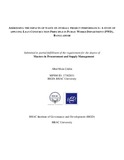| dc.contributor.advisor | Islam, Mohammad Sirajul | |
| dc.contributor.author | Uddin, Abid Moin | |
| dc.date.accessioned | 2019-03-14T06:19:27Z | |
| dc.date.available | 2019-03-14T06:19:27Z | |
| dc.date.copyright | 2018 | |
| dc.date.issued | 2018 | |
| dc.identifier.other | ID 17382031 | |
| dc.identifier.uri | http://hdl.handle.net/10361/11582 | |
| dc.description | This dissertation is submitted in partial fulfillment of the requirements for the degree of Masters in Procurement and Supply Management, 2018. | en_US |
| dc.description | Cataloged from PDF version of dissertation. | |
| dc.description | Includes bibliographical references (pages 45-50). | |
| dc.description.abstract | Presently, construction industry is under pressure and facing many types of problems. One
of the major challenges is to reduce the waste during construction. According to Carlos
Torres Formoso (1999), waste is considered as an inherent element in the construction
process all over the world, Bangladesh being not an exception in this regard. However,
success of a construction project is closely related to reduction in waste can be diminished.
This study, focused on Public Works Department Bangladesh (PWDB),aims to identify key
types of waste and examine its impact on overall project cost, time, quality, productivity
and profit during the construction phase. It also examines feasibility of use of lean
construction principle to reduce waste in order to enhance project performance. In order
to fulfill these stated objectives literature drawn from journals, research papers, conference
papers, books and credible web sources has been reviewed to describe root causes of
waste and their impacts on projects. This theoretical explanation also put lights on the
principles of lean construction and the benefits as a result of its implementation.
Furthermore, an online based questionnaire survey has been conducted to fulfill the
objectives of the study. The questions were asked on the basis of literature review and the
majority of participants agreed upon seven possible types of waste (inventory, reworks,
transportation, over processing, motion, waiting, and overproduction) generated in PWD’s
construction projects. Most of them said that waste exists 11% ‐ 20% in construction
projects under PWD. They were also asked to rank the root causes of waste along the
magnitude based on their professional experience. According to most of the survey
participants, the impact of the waste such as time over run from actual schedule of
construction project under PWD is more than 12 months cost increase from the actual
estimation due to waste is between 11% and20%. The respondents also reported
construction quality disturbed, productivity loss and profit margin lost due to waste by
1%‐10%. However, 90% of the participants agree that a new management
approach/technique is essential to produce better results in the construction sector.
Participants also ranked the lean principles on the basis of suitability. Finally,
Recommendations are drawn from the study in order to enhance construction project
performance. | en_US |
| dc.description.statementofresponsibility | Abid Moin Uddin | |
| dc.format.extent | 65 pages | |
| dc.language.iso | en | en_US |
| dc.publisher | BRAC University | en_US |
| dc.rights | BRAC University dissertations are protected by copyright. They may be viewed from this source for any purpose, but reproduction or distribution in any format is prohibited without written permission. | |
| dc.subject | Project performance | en_US |
| dc.subject | Lean construction | en_US |
| dc.subject | Public Works Department | en_US |
| dc.subject | Government construction | en_US |
| dc.subject.lcsh | Public contracts--Bangladesh. | |
| dc.title | Addressing the impacts of waste on overall project performance: a study of applying lean construction principle in Public Works Department (PWB), Bangladesh | en_US |
| dc.type | Dissertation | en_US |
| dc.contributor.department | BRAC Institute of Governance and Development, BRAC University | |
| dc.description.degree | M. Procurement and Supply Management | |

